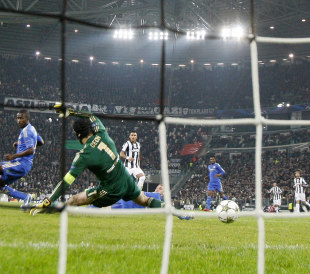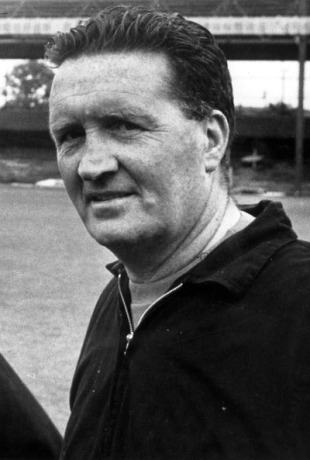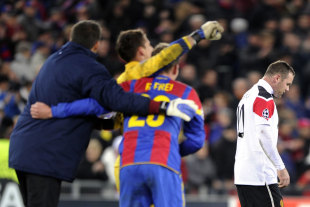- First XIs
Heroes to zeros

With Chelsea having kicked off their Europa League campaign after becoming the first Champions League winners to end their defence of the trophy at the group stage, we examine the other European Cup finalists to have fallen at the first hurdle.
Real Madrid (1960-61)
After five glorious years of domination, Madrid's monopoly on the European Cup came to an end at the hands of their domestic rivals as Barcelona claimed a 4-3 aggregate victory in the first round.
The exit came amid significant controversy. Madrid, having had to settle for a 2-2 draw at home in the first leg after the award of a dubious penalty, proved much the better team at the Camp Nou but saw three goals disallowed.
Barca vice-president Antonio Julia de Capmany felt the officials had done nothing wrong.
"From where I was sitting, the decision to disallow the goals looked perfect," he said in El Mundo Deportivo. "The linesman was right to raise his flag both times. Today on the television I could see the other was a foul too. However, I can understand that having three goals ruled out could irritate even the most balanced person."
'Irritation' did not quite capture the mood. Club president Santiago Bernabeu afterwards labelled referee Reg Leafe "Barcelona's best player", and many Madrid players confronted the Englishman as he left his hotel later that night. Two of them, Francisco Gento and Luis del Sol, apparently followed him to his car, with the latter said to have pulled him onto a low hedge and attempted to headbutt him.
Barca, meanwhile, went on to reach the final that year, but lost 3-2 to Bela Guttmann's Benfica.
Real Madrid (1962-63)
Madrid bounced back from the disappointment of the 1960-61 season to reach the final the following year, where they were defeated 5-3 by Benfica, but the great side assembled by Santiago Bernabeu was ageing. Alfredo Di Stefano and Ferenc Puskas had entered their mid-30s and, although Madrid remained as dominant as ever on the domestic stage, the need for an overhaul was becoming apparent.
After a 3-3 draw with Anderlecht in the first round, first leg of the 1962-63 European Cup, Madrid were booed by their own fans at the Bernabeu. In the second leg, a Jef Jurion goal five minutes from time condemned Madrid to a 1-0 defeat and another early exit.
"Twenty-four hours on, it is impossible to deny the obvious," Madrid's ABC newspaper solemnly reported. "The glorious era of the five-time champions has long passed. That fabulous squad - which was worthy of the [Austrian] 'Wunderteam' and Honved, maybe even superior - has died."
The regeneration of the squad came in 1964, after a defeat in that summer's final to Inter Milan, and the new-look team claimed a sixth European crown in 1966.
Celtic (1967-68)
Jock Stein's legendary "Lisbon Lions" secured a famous victory in 1967 when Celtic, with all but one of their number being born within ten miles of Parkhead, came from behind to inflict a 2-1 defeat on Inter Milan, the two-time kings of Europe led by Helenio Herrera.

As champions, Celtic had expected to be given a bye into the second round but were instead handed a tough tie against Dynamo Kiev. The Bhoys were defeated 2-1 at home, and in the second leg - after the dismissal of Bobby Murdoch in the 55th minute - they netted to level the aggregate scores at 2-2 on 67 minutes. However, because of the newly introduced away-goals rule, they were obliged to press for an equaliser and ended up conceding to Anatoliy Byshovets in the 89th minute, losing 3-2 on aggregate.
Feyenoord (1970-71)
Celtic returned to the European Cup final in 1970 but were beaten 2-1 by Feyenoord, who became the first Dutch side to lift the trophy.
Ajax chairman Jaap van Praag had expressed the view that that Feyenoord side would be "unbeatable" in the decade to come, and when they were drawn against Romanian minnows UT Arad in the first round of the following season's European Cup, coach Ernst Happel suggested his team might even reach double figures in the home tie.
However, the first leg, played a week after Feyenoord had beaten Estudiantes to lift the Intercontinental Cup, resulted in a highly disappointing 1-1 draw at De Kuip. The second leg - which had to be played in the afternoon as Arad did not have any floodlights - ended in a 0-0 draw, and the Dutch giants were eliminated on away goals.
"We had to play Feyenoord - the European and intercontinental champions!" Florian Dumitrescu, a member of the Arad team, told evz.ro. "The fear motivated us all. We had an extraordinary desire to win."
In the second round, Arad suffered a 6-1 defeat to Red Star Belgrade.
Ajax (1973-74)
After Feyenoord's exit, it was Ajax who took the baton for Dutch football, reigning supreme for the next three years in the European Cup, but their time at the top also came a humbling end.
Having been given a bye for the first round of the 1973-74 competition, they were drawn against CSKA Sofia, whom they had dispatched 6-1 at the same stage in the previous season's competition. However, with Johan Cruyff departing for Barcelona in the summer of '73, Ajax were a shadow of their former selves. They won the first leg 1-0 in Amsterdam, but looked lost as they succumbed to a scrappy 2-0 defeat in Bulgaria.
Barcelona coach Rinus Michels, who had left Ajax in 1971 after laying the blueprint for their world-conquering Total Football style, said: "It's too early to say whether Cruyff leaving means the end for this Ajax team. This is a surprise, but anything can happen in a cup tie."
Club Brugge (1978-79)
Brugge had defeated Atletico Madrid and Juventus to book a place in the 1978 final, where - as in the 1976 UEFA Cup final - they were edged out by Liverpool.
In the first round of the 1978-79 European Cup, though, the Belgians suffered a shock defeat at the hands of Wisla Krakow of Poland, losing 4-3 on aggregate after conceding two goals in the final eight minutes of the second leg. It was one of a number of poor results in a highly disappointing start to the campaign for Brugge and led them to dismiss the great Ernst Happel in December, drawing the curtain on the club's golden era.
Liverpool (1978-79)
Liverpool sparked a spell of English dominance in Europe as Bob Paisley's men claimed continental glory in both 1977 and 1978, but their bid for a third successive triumph foundered in a first-round meeting with Brian Clough's Nottingham Forest.
Forest, promoted from Division Two in 1977, had already bloodied Liverpool's nose in 1978, first beating them in the League Cup final and then finishing seven points clear at the top of the First Division.
The following season, they claimed a 2-0 win in the European Cup first round, first leg at the City Ground before drawing 0-0 at Anfield. In the second leg, Forest were outclassed but - as in the League Cup final success - clung on for a seismic victory.
Clough was unusually quiet about the successes - he was warned by UEFA after failing to attend the post-match press conferences after each leg - but Paisley had words of encouragement: "When I said that the Anfield match would be Forest's biggest test, I wasn't boasting on our behalf but trying to say there is nothing much to worry about on the continent."
He was proved right. As well as Brugge's early exit, the first round of that year's competition saw Juventus - among the pre-tournament favourites - lose to Rangers. Real Madrid were beaten by Grasshoppers in the following round, eventually leading to a battle of the minnows in the final as Forest defeated Malmo 1-0.
Nottingham Forest (1980-81)
Forest defended their trophy in 1980 with a 1-0 victory over Hamburg, but their two-year reign came to an end with a whimper as they lost 1-0 in each leg to CSKA Sofia in the following season's first round.
"This is an absolute disaster," a disconsolate Brian Clough said afterwards. "I am bitterly disappointed. We barely had a shot on goal. I could sit in a deck chair for three weeks and still not work out just what went wrong. We had nothing up front, nothing in midfield and nothing at the back. The people on the bench didn't do very well either."
Liverpool went on to reclaim the continental crown that season.
Hamburg (1983-84)
Hamburg, who beat Juventus in the 1983 final, were given a first-round bye in the following season's competition, but it did little to help them. Dinamo Bucuresti, described in The Times as "one of the most popular clubs in European football for the simple reason they are among the most consistent losers in the history of the European Cup", beat them 3-0 in the first leg to leave the German side's hopes hanging by a thread.
Hamburg were so injury-hit that coach Ernst Happel could name only three substitutes for the second leg, but his side levelled on aggregate on home soil after going 3-0 up with just over an hour played. "It seemed nothing could go wrong," Happel said.
As a veteran of early exits, he should have known better: the visitors netted two goals in the final five minutes, and Hamburg were out.
Steaua Bucuresti (1986-87)

Steaua Bucuresti became the first Eastern European side to be crowned continental champions in 1986 when they defeated Barcelona on penalties. Their presence in the final came after a victory over a heavily fancied Anderlecht side in the last four, with the Romanians winning 3-0 at home in the second leg to secure a famous 3-1 aggregate victory.
In the following season's competition, though, the Belgians had their revenge. With Steaua handed a first-round bye, they made their return to European Cup action with a 3-0 defeat at Anderlecht, ultimately bowing out 3-1 on aggregate.
Even so, they showed that their triumphant campaign was no fluke: Steaua would go on a run of 104 league games undefeated from August 1986, and they reached the European Cup semi-final and final in 1988 and 1989 respectively.
Manchester United (2011-12)
Manchester United, finalists in three of the previous four seasons' Champions League tournaments, saw their campaign come to a remarkably early close in 2011-12 as they failed to negotiate their way through a group containing Benfica, Basel and Otelul Galati.
Perhaps emboldened by his decision to play a weakened team in the 4-1 semi-final second-leg victory over Schalke earlier in the year, Sir Alex Ferguson took to rotating his squad, blooding his young players. After defeating only Otelul Galati across the six games, though, they were condemned to the Europa League.
"It hurt last year," Ferguson said in September 2012. "It hurt everybody. It's not good to go out at the group stage, particularly when we were in control. Over the previous few years we'd gone through the group stage pretty comfortably, so we were playing a lot of young players, but we never got out of the group last time."
With thanks to Max van der Put for providing information on Feyenoord's exit

